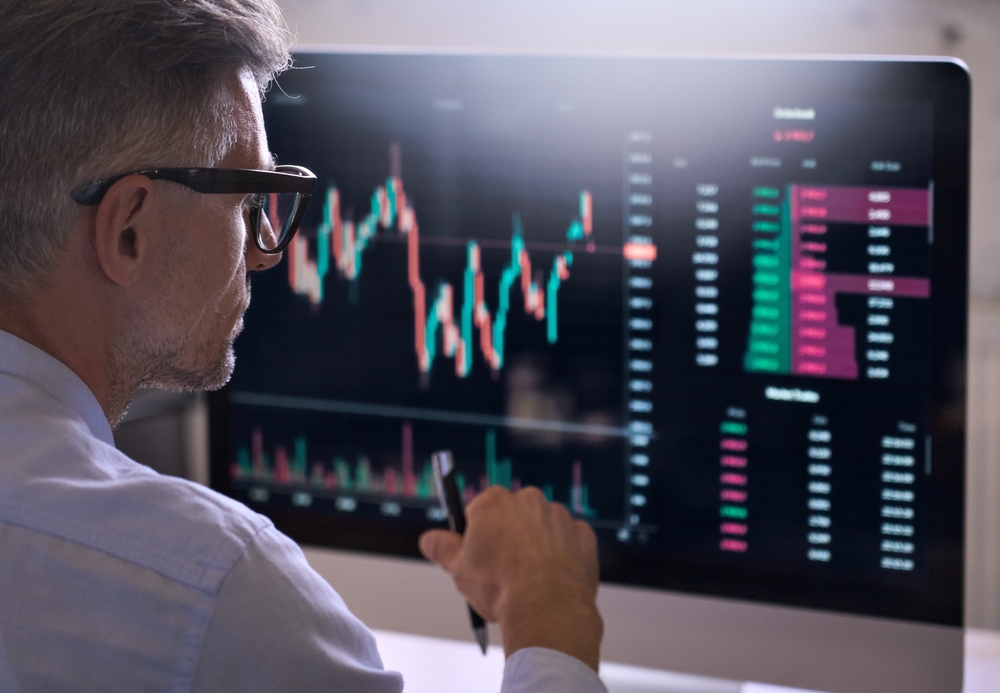
How to trade futures
Ground Picture / Shutterstock
Updated: August 15, 2023
It's the stuff of movies and TV. A seemingly unlikely person receives a hot tip on a futures trade from a questionable source. They make the trade and score big.
But is that the way futures trading works? And is it even that easy?
As you might expect, the answer to both questions is a resounding no. Futures trading is a highly sophisticated alternative form of investing. It's actually more of a hedging strategy than anything else — hardly suitable for the average investor.
But investors engage in futures trading every day, and many make money in the process. For that reason alone, futures trading is worth knowing about. Maybe you're not interested in futures trading as a regular activity, but there may be a situation or two where you'll want to give it a try. If so, you need to know how to trade futures.
What are futures and how do they work?
Futures are a contract to either buy or sell a physical asset or security at a specific price by an agreed-upon date. They trade in a fashion similar to stocks, bonds, and other financial instruments, but they are, in fact, very specific contracts rather than securities.
In each contract, one party agrees to buy a certain amount of assets — which can be commodities or financial instruments — by a certain date. The counterparty, the seller, agrees to deliver the assets in the amount specified by the contract's date.
Unlike options contracts, a buyer actually agrees to take possession of the assets in the contract.
We're going to get into this topic deeper in a bit. But because of the nature of futures contracts, they're mostly done by institutional investors and industry insiders and are primarily designed for them. That's because they're designed for participants in the industry connected to the underlying assets. Put another way, futures contracts are a serious business arrangement, with investment/speculation potential as a secondary consideration.
How to trade futures
Futures are not quite like buying a share of stock. Investors make money by buying a common stock at a low price and selling it at a higher price at a later date. Futures can be traded using an online stock broker, such as TD Ameritrade and E*TRADE.
People usually use a futures contract to protect a specific price level from swings in the market.
- A futures trader (speculator) seeks primarily to reap investment gains on a standalone contract. But most people buy and sell futures as a hedging strategy.
- A gasoline producer, for example, sells a futures contract to lock in the price of a specific amount of fuel for delivery on a specific date. The price of gasoline fluctuates wildly — literally from day-to-day.
- So the producer sells a futures contract to sell a certain amount of gasoline at a fixed price for delivery at a specific future date. It may sell 10 million gallons of gasoline at $2.50 per gallon upon delivery in 60 or 90 days. The futures contract protects the company from any unexpected drops in the market price of gasoline.
- A gasoline distributor buys the futures contract to protect against an unexpected rise in the price. They lock in the $2.50 per gallon price.
- In this case, both the buyer and the seller use the futures contract as a hedge against significant price swings. This type of futures contract is common. Both parties work in the gasoline business — on either the production or distribution side. That is, they are principals in the industry and not speculators or investors.
Who can trade futures?
As you can see from the above example, futures contracts are primarily tools used by businesses engaged in certain industries. These contracts create greater predictability in price levels, whether selling or buying a commodity or security. The main purpose of futures contracts at this level is to reduce the risk that comes with price swings.
But as is the case with many financial instruments, futures contracts have also turned into investment vehicles for both investors and speculators. These people take advantage of futures contracts for profit rather than to protect against price swings.
For example, using the same example of gasoline, let's say an investor foresees a rise in prices. This could be due to an expectation of instability in an oil-producing region or problems with a major oil-producing company. Whatever the reason, the investor thinks the price of gasoline will rise from the current price of $2.50 per gallon to $3 per gallon.
The investor takes advantage of the expected increase and buys a futures contract agreeing to buy 1,000 gallons of gasoline at $2.50 a gallon in 90 days.
By day 90, the price of gasoline does indeed rise to $3 per gallon. They purchase the 1,000 gallons of gasoline specified in the futures contract for a total of $2,500. Then they immediately sell it on the open market for $3,000. Because the price change has gone in the investor's favor, they earned a $500 profit on the exchange.
That is, of course, an optimistic scenario. The price change is equally likely to go against the investor, which is why futures contracts are primarily traded by institutional investors engaged in the specific business tied to futures contracts.
Related: How to invest in stocks
What's in a futures contract?
As a contract, futures include very specific terms. Those terms commonly include:
- A description of the commodity or security involved
- The names of the parties to the contract
- The unit of measurement of the commodity or securities (barrels of oil, ounces of gold, bushels of wheat, etc.)
- Settlement terms of the contract, which can include cash or physical delivery of the specified quantity of securities or commodities
- Currency units, like dollars, pounds, or yen
- The number of units included in the contract
- Any specific details of the commodity or securities to be delivered, such as the grade of oil or fuel
If you're entering into a futures contract as an investor or speculator, make certain the trade will ultimately settle in cash. Otherwise, you'll be required to take physical delivery of whatever the commodity is. And unless you are engaged in an industry that uses that commodity, you'll have neither a purpose for it nor the storage capability.
Futures trading risks
- The most obvious risk involved in futures trading is that the trade could break against you. In the example of the individual investor entering into a futures contract to buy 1,000 gallons of gasoline at $2.50 a gallon, the trader incurs a loss if the price for gasoline falls below $2.50 per gallon within the term of the contract. For example, instead of a $500 gain, the investor loses $500 if the price falls to $2.
- If you're the buyer in a futures contract, you will be obligated to pay the commodity or security price listed in the contract, regardless of the market price on the specified date of delivery. Futures contracts also involve fees. This both reduces gains and increases losses.
- But perhaps the biggest risk of all with futures contracts is that the underlying commodity or security in the contract is marked to market on a daily basis. That means the value of the contract changes constantly. You may be required to deposit more money into your trading account on days when the underlying commodity or security price goes against you. This is something like a “margin call” in a brokerage account.
The margin for futures contracts
And speaking of margin, futures contracts — especially at the institutional level — often involve a lot of it. Brokerage firms generally limit you to no more than 50% leverage on the purchase of a commonly traded security. But leverage on a futures contract can be as high as 20-to-1. That means you can enter into a $100,000 futures contract with an out-of-pocket investment of just $5,000.
On the positive side, a 5% increase in the price of the underlying commodity or security results in a 100% gain on your investment. On the negative side, a 5% loss wipes out your investment entirely. And a loss greater than 5% requires you to put up additional capital.
Finally, because futures contracts typically involve large dollar amounts, trading futures is not an activity routinely engaged by small investors.
Futures vs. options trading
We need to distinguish between the terms “futures” and “options” because the two are commonly used simultaneously. But the two are only remotely related.
- As discussed, futures contracts' basic nature involves hedging strategies that could require either delivering or taking physical custody of a commodity. However, options are based on underlying valuations and don't typically involve the transfer of the underlying commodity.
- Like futures, options are also a contract. But options give the holder the option — but not the obligation — to either buy or sell an asset at a specific price within a defined timeline. Unlike a futures contract, the holder is not required to buy or sell the underlying investment. He or she can simply let the option expire.
- If a futures contract is a hedge, an option is a type of derivative. An option provides an opportunity to buy or sell securities without taking actual ownership of those investments.
An example of an options contract
Under an options contract, you may purchase the option to buy 100 shares of a stock at $50 per share. Though the transaction's total value would be $5,000, you won't need actually to put up that much money. Instead, you pay a premium for the option. This represents a fee for the transaction.
If the options contract gives you the right to buy the shares at $50 within 90 days and the price goes to $60 on day 75, you can exercise the option. You buy the shares and immediately sell them for $1,000 profit ($6,000 minus $5,000).
However, if the price of the underlying security falls to $40 per share, you can simply let the option expire without any requirement to purchase the stock. You lose only the amount you paid for the option premium.
Options are much simpler and have a lower risk than futures contracts. They're much more common among smaller investors. In fact, many top investment brokerage firms allow you to trade options. Here are the leading ones:
| Highlights | E*TRADE | Ally Invest | Webull |
|---|---|---|---|
| Rating | 4.8/5 | 4.5/5 | 4.3/5 |
| Minimum investment | $0 | $0 | $0 |
| Stock trades | $0/trade | $0/trade | $0/trade |
| Options trades | $0.65/contract | $0.50/contract | $0 |
| Crypto trades | ❌ | ❌ | ✅ |
| Mutual funds | ✅ | ✅ | ❌ |
| Virtual trading | ✅ | ❌ | ✅ |
| Learn more | Visit E*TRADE | Visit Ally Invest | Visit Webull |
Futures trading is not for beginners
Despite the talk about futures trading and the frequency with which it takes place among institutional investors, it's not a recommended investment strategy for the average investor. Both the dollar amounts involved and the risks faced are much greater than with either options or regular trading of stocks and other securities.
However, it's a good idea to understand how futures trading works in case you decide it's an investing strategy you want to try out here and there. It's best, though, to attempt futures trading only when you have some trading experience. And if you ever do trade futures, remember to keep your risks low by investing only a small portion of your portfolio. Futures trading is risky, even for the most experienced trader.

Kevin Mercadante is professional personal finance blogger, and the owner of his own personal finance blog, OutOfYourRut.com.
Disclaimer
The content provided on Moneywise is information to help users become financially literate. It is neither tax nor legal advice, is not intended to be relied upon as a forecast, research or investment advice, and is not a recommendation, offer or solicitation to buy or sell any securities or to adopt any investment strategy. Tax, investment and all other decisions should be made, as appropriate, only with guidance from a qualified professional. We make no representation or warranty of any kind, either express or implied, with respect to the data provided, the timeliness thereof, the results to be obtained by the use thereof or any other matter. Advertisers are not responsible for the content of this site, including any editorials or reviews that may appear on this site. For complete and current information on any advertiser product, please visit their website.





